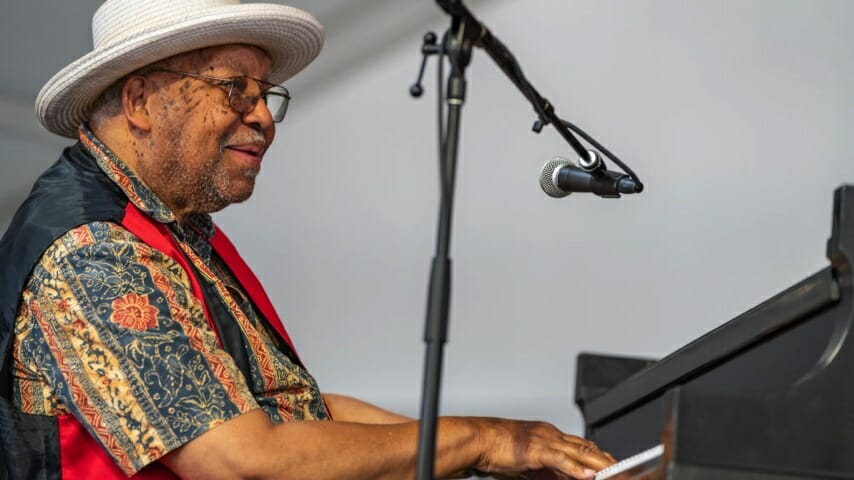Ellis Marsalis: Family Patriarch and a Hell of a Pianist (1934-2020)
Photo by Douglas Mason/Getty
Most folks know of Ellis Marsalis as the patriarch of perhaps the most famous family in jazz. And he deserves all the credit in the world for creating a home environment that produced four notable jazz musicians: trumpeter Wynton Marsalis, saxophonist Branford Marsalis, trombonist Delfeayo Marsalis and drummer/vibraphonist Jason Marsalis. But Ellis, who died of covid-19 on Wednesday, April 1, at age 85, was a lot more than that.
For one thing, he was a terrific pianist in his own right. That was obvious when I heard him at the New Orleans Jazz & Heritage Festival in 1990. Wearing a bright pink shirt, thick glasses and a wide-brim, white-straw hat in the subtropical sun, the 55-year-old Ellis led a quintet featuring two former students: his son Jason on drums and Jeremy Davenport on trumpet.
They began with a piano-trio treatment of Duke Ellington’s “Just Squeeze Me (Don’t Tease Me),” with Ellis adding witty, rhythmic flourishes to the jaunty blues, and keeping the melody afloat even while playing a two-handed chordal solo. He followed that with a quintet version of “So Near, So Far,” negotiating the chord substitutions as nimbly as Herbie Hancock had on the famous Miles Davis recording. He later played knotty, modernist tunes by his fellow New Orleanians James Back and Alvin Batiste. Ellis could do it all.
The festival has two venues for jazz: Economy Hall, which focuses on the city’s traditional sound, and the Jazz Tent, which showcased post-bop and contemporary jazz. Ellis always played in the latter space, for as much as he admired the city’s brass bands and trad groups, that wasn’t what he did. He was a disciple of Thelonious Monk and Bud Powell, and he possessed the same harmonic sophistication and rhythmic dexterity as that duo’s other apostles: Bill Evans, John Lewis, Hank Jones and Wynton Kelly. Ellis devoted an album to Monk and named his second oldest son after Kelly.
True, Ellis never achieved the same level of fame as those other pianists, but that was a matter of priorities, not a matter of talent. After graduating from Dillard University in his hometown of New Orleans in 1955, he left town to try his hand at the jazz life. He recorded with Cannonball and Nat Adderley as well as drummer Ed Blackwell, but in 1959 he married Dolores Ferdinand and decided to settle down in Louisiana. Wynton was born in 1961, followed by five more brothers. Ellis sacrificed fame and income to stay home and raise a family. He made a similar sacrifice by playing the jazz of the ’50s and ’60s rather than the tourist-friendly sound of the ’20s and ’30s.
“There was no jazz scene in New Orleans after World War II,” he told me in 1985, “except for the traditional guys who worked down on Bourbon Street. For the most part, those guys could play, but it was just entertainment music. But the link to the creative side of New Orleans jazz was never broken, and never will be broken. It’s just that it doesn’t always manifest itself; it doesn’t jump up and beat you over the head.”